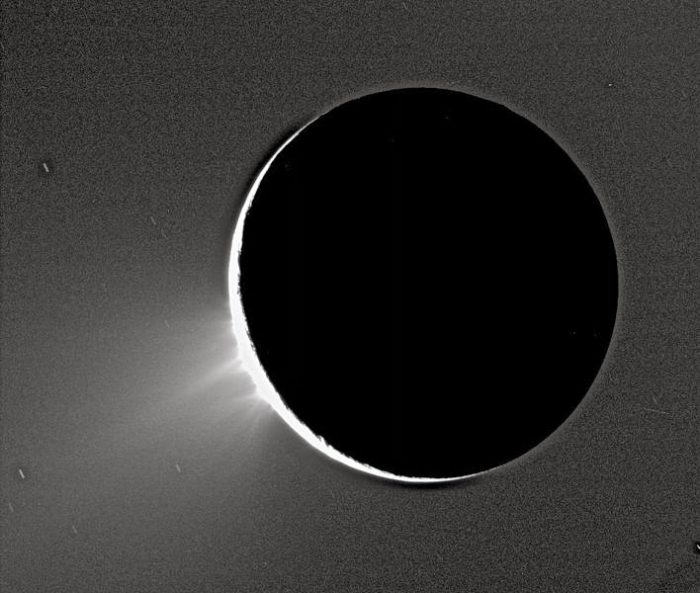Alien Intelligence in Our Solar System?
Note this post is adapted from a 2014 post on my personal blog and looks at where alien life may realistically be found in our Solar System, including possible intelligent life. And what that should mean for science fiction writers, including Christians who write science fiction.
It’s interesting that all the way back to the earliest days of what can be considered science fiction, Lucian in the second century AD talked of traveling to the moon in order to meet intelligent beings living there (though in a satire). Likewise the “The Adventures of Bulukiya,” which is part of the medieval Arabic-language classic One Thousand and One Nights, features travels in the cosmos and interactions with various beings there. It was also a staple of science fiction as we know it that began in the late 1800s to expect at least some of the other planets of the Solar System to be inhabited. Mars especially, because it showed changes in its icecaps in seasons that seemed to be like Planet Earth and had linear features that reminded some people of canals (especially Percival Lowell), became the center of attention for many early science fiction stories, from being the home of invaders of Earth in HG Wells’s The War of the Worlds, the home of the people of “Barsoom” in Edgar Rice Burroughs’s science fiction, and also for a lot of other science fiction, including Ray Bradbury’s The Martian Chronicles.

Image copyright: Warner Brothers
Mars still fascinates people, in spite of scientific data showing the planet is a far more hostile environment for life than Antarctica and the Atacama Desert combined. Mars, a beneficiary of being one the planets nearest Earth, remains a focus for most future plans for human interplanetary travel–and sometimes people have even believed aliens must have lived on Mars in the past, even if they don’t do so now (as the Face on Mars was supposedly an alien construct, as featured in the year 2000 film, Red Planet).
We could even say that the lack of clear evidence for life on Mars when the Mariner probes passed by it in the 1960s and the Vikings landed on it in the ’70s changed the expectations of science fiction fans concerning where life would be found in the universe. Instead of moving from planet to planet within our Solar System, science fiction like Star Trek would feature future humans travelling from star to star and finding inhabited worlds around each star (though the aliens found there often shared features in common with creatures previously imagined to have lived on Mars).
It only takes a little scientific knowledge to see how the expectations for Mars probably were always a little inflated, since it was evident as soon as telescopes were first turned on Mars that it lacked the blue we associate with large bodies of water. Mars clearly was a dry place, and deserts on Earth happen to be those places where life is least abundant. And the drier the desert, the less life it has. (Parts of the Atacama desert in South America are so dry that not even microbes live there.) Coupled with its cold temperatures and lack of atmosphere, yeah, expecting to find even microbes on Mars seems to be a long shot.
If alien life is ever going to be found in our Solar System outside of Earth, Mars almost certainly won’t be the place. A much better place to look for life is beneath the icy surface of certain moons in the outer solar system. This notion has not entirely escaped science fiction writers. But it deserves much more emphasis in stories than it’s received.
I say this for simple, straightforward reasons. Everywhere on planet Earth where water is abundant, life teems. The water can be that of a geyser in Yellowstone Park (or elsewhere), extremely hot, yet life is still found in these geysers. The glaciers of Antarctica support some life themselves, but drilling under the ice to a region where pressure is high enough to preserve liquid water has shown much more abundant bacterial life below one half mile of Antarctic ice.
Jupiter’s moon Europa shows clear signs of having liquid water under an icy surface. The smoothness of the planet (as opposed to being a cratered planetary surface, like the moon) shows cracks that appear to heal themselves as liquid water from below solidifies, as if all the features on the surface were gigantic floating glacier formations on top of a deep, dark ocean under the surface.
Saturn’s moon Enceladus does even better. Not only does it have an icy surface, the Cassini probe has photographed it shooting out into space what have been verified as plumes of water (reminding me of the geysers of Yellowstone Park).
As early as Arthur C. Clarke’s 2010: Odyssey Two in 1982, science fiction writers have been speculating that the persistent link on Earth between life and liquid water could mean that Europa teems with life under its relatively thin crust. But it turns out that icy moons with liquid water under the surface is a fairly common phenomenon in our Solar System (and possibly would be common around other stars as well). Among Jupiter’s moons, both Ganymede and Callisto may also have liquid water deep under a thick icy crust–rather like Antarctica, though much deeper.
While a number of science fiction writers other than Clarke have noticed the potential of water oceans under icy moons, this notion has barely crept into the science fiction with a broader audience, the sci fi of films and television. If there was an episode of any of the Star Treks where an alien civilization came from underneath an icy crust, or where a crew landed to make contact with or explore the life in a sub-surface ocean, I missed it.
Our expectation in most science fiction remains that life will be found on worlds similar to Earth. And not just in science fiction. NASA officials and other scientists continue to engage in discussions of whether Mars, the most Earth-like planet in the Solar System, may have hidden water remaining from its past and if we should search for life there–public support for searching for life in whatever small bits of water that remain on Mars seems higher than going to other worlds further out that have much more water.
Overall I’d say that the likelihood of life on Mars is very low and the likelihood of life in places like Europa and Enceladus is good. Which is a simple enough notion. As is the idea that where life may be, intelligent life may also exist.
So how should what I said above affect science fiction writers, including especially Christians who write sci fi?
It’s a bit of an oversimplification, but authors who write science fiction while self-identifing as “Christian” generally tend to believe God had some role in the creation of the universe, be it as little as a guiding hand in evolution or as much as creation ex nihilo in a time frame that matches the 6,000-year framework of a straightforward, literal reading of Biblical genealogy. Writers who see God’s hand in creation ought to be thinking about what happens when the watery oceans under these icy moons are finally explored.
If the water under these moons is as sterile as the Normal Saline Solution administered to hospital patients, that would say something about Earth being a special place, wouldn’t it? Wouldn’t such a finding support the idea that Earth is the unique place where God created life? Though of course materialists would not necessarily admit that’s what such a finding would imply. Instead they’d search for naturalistic reasons for why planet Earth is different.
But what if life under these icy moons if found, but is found to be genetically linked to life on Earth? Or even perhaps closely related to or even identical to at least some life on Earth? Wouldn’t this point to a common Creator of life both on Earth and these other worlds? Those of us who believe in a form of divine intervention in the creation of life (no mater what kind, even if only providential) would say so. Though of course those with no notion of the existence of a Creator God would be searching for alternate explanations, such as Panspermia.
What if life is found, but it has no genetic relationship to any life on Earth whatsoever? Would this imply that evolution is a strictly naturalistic process that occurs whenever the conditions are right and potentially could turn out many different ways via the chance interaction of forces? Of course for believers in any form of divine intervention in creation, but especially for those who believe God has providentially guided evolution, finding bizarre alien life would not necessarily be a concern. God’s creative acts will simply be seen to be more mysterious that we previously thought by most believers.
Note especially that the conditions that are thought to have influenced the development of human intelligence would not have existed on an icy moon. So I think few people who have a strictly materialistic view of the universe would expect to find intelligent life on these icy-covered ocean worlds. Yet for those who see evidence of the existence of a Creator God, we are not under such limitations. God could create alien intelligence wherever he wants, right? And why not in a place where life is already abundant?
If alien intelligence is found in one of these oceans, what will it be like? Clearly not like dolphins, who need to come up for air (and there’s no way to do that on Europa or Enceladus). But might it be more like an octopus? Or like something we’ve never imagined before? As of now, only God knows.
I personally have never written a science fiction story set on an moon that has an ocean under an icy surface. But perhaps I should do so. Perhaps finding life on one of these moons will be the most important discovery of the 21st Century–and only God knows if in finding life out there (if the human race does find it), that discovery will include meeting intelligent beings we will be able to find a way to converse with. Perhaps it will.
Perhaps the old dreams of meeting intelligent life in our own Solar System will prove to be prophetic–even if that intelligent life won’t show up on Mars like nearly everyone thought. Whether that discovery of life happens or not on the moons this post mentions is something science fiction writers have no direct control over.
But we do have the ability to consider what might be there lurking under the surface of these icy worlds and to craft stories that imaginatively go there. And such stories might even influence how any discovery(ies) of alien intelligence(s) in our own Solar System are interpreted and understood in the future–if any (God willing) should come to pass.
For readers of this post, are you familiar with any science fiction that features exploring oceans under the icy surfaces of moons (in our Solar System or elsewhere)? If so, who wrote it and how did the story turn out?
And what do you think might be found in these deep oceans around other moons or planets?











































When it comes to novels about life on another Planet, I’ve just begun developing ideas for one. Here is the introduction:
xxxxxxxxxxx
In the beginning, God created the myriad multitude of galaxies, throughout entire the Universe. Among the galaxies, He created a multitude of Earthlike planets. On one of those Earthlike planets, the Adam and Eve of that world, begat sons and daughters, before the forbidden fruit was eaten. Several generations have been begotten, and so far, no one among them has taken a bite.
xxxxxxxxxxxx
As I said, I’m just at the beginning of developing the story. I’m not anywhere near ready to begin the actual writing. After reading the introduction, there is something that should be obvious.
Oh! Have I got a lot of work ahead of me!
What are your thoughts about life on planets that are not Earthlike?
“…life on planets that are not Earthlike?” That’s something I’ve never actually thought about. I don’t usually write sci/fi. Most of my fiction could be classified as Suspense/Thriller, often including Supernatural.
The introduction, to the novel that I’ve posted here, could be classified as Science Fiction. After that, the actual writing might be called “Modified History”, based on ancient sacred writings. I should also state that the work is fiction, and that I am not committing heresy.
I don’t know if my reply answers your question.
There is an episode of Voyager where the crew finds an ocean (no land or solid matter at all) floating in space. It had been there an untold number of years but was inhabited in the recent past (several hundred years as I recall) by an alien race. It had life in it that even they did not know about.
For myself, I have a series of stories I’m working on (presently on the back burner due to other projects) where man ventures to the stars and finds no life but many worlds perfectly made to receive the life forms of earth. This is because in God making the universe and the world for man, man was to inhabit those worlds as well as his own home world. We just disobeyed and were stuck here.
I remember that Voyager episode–not quite what I’m talking about, but kinda similar.
It certainly would be an interesting story idea to find worlds without life but with oxygen atmospheres, which scientists confidently say cannot happen naturally…
When I write SF, I have a tendency to imagine orbiting stations and inhabited planets in the Milky Way Galaxy, with some linking between Earth and this other planets through similar faith stories, or a genetic link between species.
My question to you though is if you ever imagine inhabited planets that are radically different than Planet Earth?
Life on other planets being genetically linked to us wouldn’t necessarily mean much either way, as far as God’s hand being involved or not. He can make things however he likes, and would do things according to what he wants and what will be best. Maybe that means alien life would have genetic similarities to us, or maybe it wouldn’t. But whatever people find in terms of that, people will rationalize the implications of that discovery in whatever way they see fit.
Can’t recall any stories about water worlds right off the bat. I’ve considered making a story based on that at various points, but for the most part the ideas are just little seeds right now, rather than plots in the making. I have a mostly aquatic world, but there’s still land in it. Most of it is just buried beneath tons of ocean, though there’s tiny islands now and then.
A world made entirely of water poses some interesting story telling issues, such as having a harder time defining a sense of location and destination and even purpose. There wouldn’t be any landmarks. And if the world is, say, covered in ice or other harsh surface conditions, navigating based on the stars would be hard. So there’s a lot of differences to account for with such a story world.
Here’s some more info about life that exists under completely different conditions than what we’d consider normal. Along with the circumstances and environments they could live in:
I disagree with you a bit. Since the concept of evolution in general asserts that life developed naturally, without any guiding hand of Divine intervention (as is seen in the videos you shared), it would be a surprise to find life with DNA that matches DNA found on Earth. But if the match were only partial, the surprise would be a lot lower, since people would be thinking of comets or other celestial bodies somehow transferring early DNA from one place to another.
But if we found a planet, let’s say Enceladus, in which exact species that exist on Earth, say of various kinds of octopus, ALSO exist there, then that strongly would imply a Divine Creator having intervened in the story. Materialists would at first be flabbergasted by this, but then would counter that ancient aliens must have moved species around.
But a kind of unity of life across different worlds really would imply the same Creator of all of them. Therefore, a lack of similarity of life on different worlds would support the idea that life erupted by essentially random forces acting to create life. Believers of course could still assert “God can create anything he wants” (and be correct) but nothing about that kind of discovery would even make believers in a strictly materialistic universe blink.
But I think there are plenty of future discoveries that will make those who believe in a universe without God wonder “How did that happen?” Because I think that’s part of how God operates.
Hm, yeah, I was thinking more in terms of partial DNA similarities. Here on earth most things aren’t exactly the same, so even with a Creator in the picture, we couldn’t necessarily expect to find something that is basically a clone. Like, it’s possible, but in general not even two members of the exact species are going to have the exact same genetics.
Even if we did find an earth species on another planet, it would probably be in a similar niche/environment as its earthly counterpart, (or else inside a niche where it’s adaptations would be useful) In which case, people would probably say it’s the result of convergent evolution.
Even in a very strict six day creationist worldview, there’s still some evolution, though. Like, that theory starts off with two human ancestors (Adam and Eve) and diverges into the wide spectrum of races we have today(technically that’s a very small divergence, since humans are all very genetically similar, but still an evolutionary one). And a lot of six day creationists might want to include Neanderthals in the divergence from Adam and Eve.
There’s also other types of evolution that would be acceptable in six day creationist terms, like artificial selection, which basically includes the way humans selectively breed dogs and farm animals and such. A similar process happens with natural selection as well. So, even if, six thousand years ago, God made an octopus species on another planet that was the same as one on earth, they would have probably diverged from each other a little bit by now. And whether or not we would have fossil evidence for the same species existing on both planets at one point would be unpredictable. Like, on a completely watery world, would we still have fossils?
If we did find an exact earth species on another planet, it would probably be easier to say that God’s hand is in all of it, but it wouldn’t be a requirement. God would probably create things to match the environments of other planets, or according to his own desires. So finding bizarely different life on other planets could just as easily be a testament to God’s creativity and practicality, rather proof of evolution and nothing more.
If they kept discovering planets over and over again and none of the creatures have any resemblance to anything on earth, though, would your faith be challenged? If so, there’s not really any reason for it to be.
That feel when you want to start a discussion but Star Trek has Already Did It.
Tho I do enjoy the riffs on Humans are Space Orcs: https://www.pinterest.com/search/pins/?q=humans%20as%20space%20orcs&rs=typed&term_meta%5B%5D=humans%20as%20space%20orcs%7Ctyped
TANGENT AHOY: Makes me think of bioengineering species for new adventures! Like resurrecting the mammoth, or redesigning horses so they aren’t so fragile (guys, there are SO MANY things that can go wrong with horses).
But it turns out the Internet doesn’t have an easily accessible comparison between horse bones and deer bones, and only relatively useless ones in archaeological contexts for horse bones vs cow bones, so I don’t have the fodder for determining if two-toed anatomy is an improvement on one-toed. Or how that might make a difference between a gait comfortable to ride and a bone-rattling nuisance. But it seems if we gave horses the ability to throw up, that would improve horse husbandry a whole heck of a lot. Should we give them an extra stomach? That would probably make them easier keepers, but would the resulting change affect their anatomy on their speed and agility? What if we made them browsers like donkeys rather than grazers?
Something important to understand is that what is an ‘advantage’ or ‘disadvantage’ depends on the environment or situation. Like, an animal with short fur and large ears would do better in a desert, but not in the arctic. As far as a situational issue…a human’s ability to throw up is a good thing, but if they happen to be laying on their back while vomiting, they can accidentally breathe it into their lungs and choke. So you would probably have to know a lot of specifics about the environment you’re trying to bring horses into.
As far as the amount of toes, if I recall correctly, earlier ancestors of horses had multiple toes, so that means that in some environment or other, there was some advantage to having fewer toes. Or, at the very least, fewer toes didn’t inhibit their survival.
Here’s some answers to your questions. And yes, I like PBS Eons 😛
Man, I miss having PBS on tap. I guess now I’m motivated to see how much I can stream online.
Notleia, I’m afraid I don’t get your point about what Star Trek already did. Maybe you were actually talking to Autumn?
Anyway, I certain wasn’t talking about anything Star Trek has ever done that I know of. They did interstellar travel to Earthlike planets and never asked any intelligent questions along the lines of “What would qualify as reasonable evidence for Intelligent Design in discoveries of alien life?”